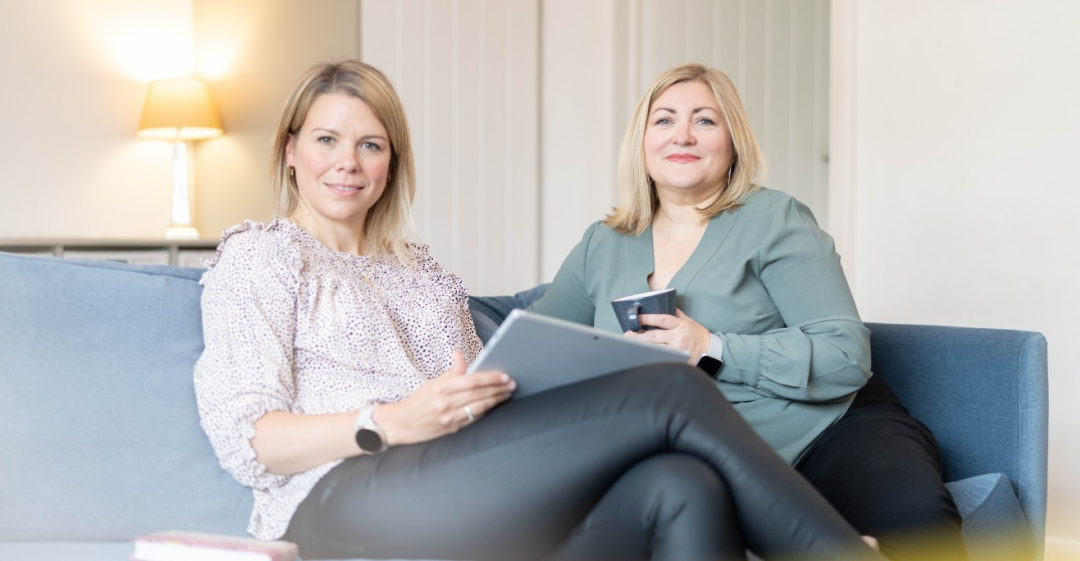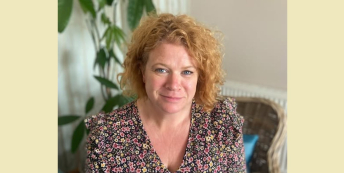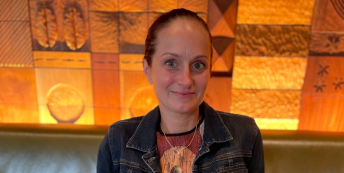“Even on the days when things are harder, there’s no desire to go back to our old work lives.”

Newly Updated
What work were you doing previously?
Klara: I've always worked in marketing.
After studying marketing at university I worked on the corporate side for a company in their communications department. Then I worked in numerous agencies for a range of clients. Marketing was always what I'd wanted to do.
Mel: The last 10 years of my career was working at a global engineering consultancy.
Prior to that I had worked in advertising and sales as well as specialist recruitment consultancy..
Initially I was involved in recruitment for their management consultancy business. Then I'd taken on training and managing the training department which led to getting more involved in HR projects. At that point the HR function had been centralised and I went to work for their improvements team.
I'd become their poster girl for flexible, part-time working, and the fact that you could still have a career that was in an upward trajectory whilst being a part-time employee.
What are you doing now?
Klara: We run Marketing Lab together, and we now focus on LinkedIn.
As LinkedIn consultants we work with founders, directors and CEOs to help them become more visible on LinkedIn and therefore get more leads. We do everything from the consulting part to strategies and training.
How did you feel in your work before you decided to make the change?
Klara: I've always enjoyed what I was doing as such.
But you start to notice a change when you have children, where you want to work part time and things weren't as flexible at that time as they might be now.
Towards the end, one of my biggest clients was a Spanish hotel chain which meant travelling over to Spain quite a lot. While it was lovely, when you have children it makes it a lot harder.
While I was on my second maternity leave my old boss left and I knew I was coming back into a new environment. I came back for a couple of months part-time, was offered to go back full time but I declined that and was made redundant.
Mel: I enjoyed what I did.
But as I went on to my second maternity leave I became increasingly aware that in order to do the amount of travel that was needed, office-based and with long hours, I knew there would potentially be an issue with how much of a struggle that would be.
Flexible working was very much a novelty back then and didn't mean remote working or having truly flexible, changeable hours. The idea of saying "I can't make that meeting at 6pm as I have a school pick up at 5pm” would have been very much a no no, especially in a corporate setting.
Also internally at work there were quite a few things changing for me. My boss was moving on, and I’d be working with a previous boss that I wasn't massively relishing.
So even before being made redundant I was at a crossroads of wondering if the job was really a fit for what I wanted my life to be going forward, with two young children.
Why did you change?
Klara: Being made redundant, I took some time and extended my leave to have a think about what I really wanted to do next.
At that time it was hard to find a part-time job in the marketing industry that was local and would work around my family's needs. I then thought I might have to work for myself to get that flexibility.
It had also always been at the back of my mind that at some point I wanted to work for myself rather than other people.
Mel: I was also made redundant.
As part of my redundancy package I got some careers coaching which was invaluable for me, because I’d never spent that time thinking about what I wanted to do.
If someone is at a crossroads and can get some coaching I'd recommend it, because it's someone who doesn't know you, they're not trying to give you the answers, and it really helped me explore what I wanted.
Out of those conversations, it led to the coach saying she really thought I should set up my own business, and she didn't think I was the kind of person who'd want to work alone.
I've always had jobs that have been very people-centric and I'm an extrovert, so she said working alone is probably not the right thing for me.
By the end of those sessions I'd come to the stage where I thought yes, I want to run a business with someone or other people. That's something I hadn't really thought of before.
Are you happy with the change?
Klara: Yes.
I love the freedom, and knowing that when you put more effort in, most of the time, you get more out of it.
When you work for someone else it doesn't matter so much how much you work, the reward is not always there in the same way, not just financially but also in terms of your own sense of achievement.
Mel: Yes.
We wouldn’t go back. Of course as a business owner there are tough times. In recent years with Covid and Brexit it's really been unprecedented times. But as they all happened as we've been with the business, we're used to going and changing as situations have done.
And in some ways these changes have been a good thing for the online and digital world, so we're lucky in that respect.
Even on the days when things are harder, there’s no desire to go back to before – we'll dust ourselves off and find a way forward. There's nothing of that old life that I miss.
What don't you miss?
Klara: I don’t miss the office politics, the tick-box stuff, and doing things just because.
Mel: The hierarchy.
In the environment I worked in previously, we were actually graded with a number. Your grade affected what seat you got and how near you were to a window. It affected your pay and benefits. At the beginning of my time there I’d worked as hard as I could to go up the grade scale.
So I’m happy to not go back to that or be judged by that.
How did you go about making the shift?
Klara: Both our children started school together.
We didn't know each other at that point and we met at the school gate. Not long after that we decided we were both in a similar situation, we had complementary strengths and decided to try to set up this business together.
We spent a lot of time and effort on the planning and making sure it would work. We put together a five year business plan and really thought about how we wanted the business to grow. We had similar values and always wanted to be really sustainable in how we set up the business.
Mel: We both made a very small initial investment to get everything up and running.
We got an accountant early on as we thought it was important to make sure the finance side of things ran well, but everything else we did initially ourselves. We then invested money back in over the time the business has grown.
We offered something slightly different when we started to what we offer now. At the start we built something that drew on both of our past experiences.
At the time there was a really thriving local chamber of commerce and from our first meeting there we got our first client. That was when things went from having a hypothetical business to having a client and being a real business.
Networking for us was where we initially found clients that we worked with.
In those initial months it became very clear that social media was the biggest service that local businesses wanted to use us for. That led to me retraining and Klara refreshing her training, taking it from broader marketing to digital marketing.
So the business began to transform pretty quickly from our initial set up to just offering social media services. And from that point we've since specialised into LinkedIn.
It’s been a constantly evolving process.
How did you handle your finances to make your shift possible?
Klara: I had a redundancy package.
I was also lucky in that my other half could support the family and we could live without my salary for the initial period.
Mel: Same for me.
Between the redundancy pay and family support, we were able to push through that transition period.
When me and Klara went through ideas before setting up the business, we were looking at things like overheads. We knew we wouldn't be buying stock or hiring premises, we would be selling our expertise, so that meant our start-up costs were lower.
We were able to be very frugal about our outgoings when setting up the business. I think it can seem like you need to invest a lot up front on business advice, or advice on how to get set up legally, but a lot of information is out there for free (for example on the government website).
There's things you don't need when you start, but you could consider investing in later as you start to make profit.
What was the most difficult thing about changing?
Klara: Being made redundant doesn't make you feel great, so it was building ourselves up that we are good enough that people actually want our services.
I think that was probably the hardest bit.
And while redundancy isn't a nice thing to go through, sometimes you need that push to make a change. In my case I wouldn't have dared to just quit my job and take the step to become self-employed or set up my own company if I hadn't had that push.
At the time redundancy was awful but now I'm pleased with how things have turned out.
Also some people found it hard to wrap their head around the idea that you could run a successful business that also can work flexibly around a family.
Mel: I think the hardest thing was not having the big name and brand of a company behind you, and all of the support services that that offers.
For example, for IT issues we’d both been used to just picking up the phone and speaking to IT support. But as a small business we didn't have that.
One time it took us two days to figure out an issue, and we couldn't retrain to become our own IT people! So it's things like that where you realise you used to have a big support mechanism that isn't there.
And at the time when we launched the business, there was quite a big push about 'mumpreneurs' and that women in business who had kids were mumpreneurs.
But me and Klara never massively associated with that, we just wanted to be thought of as business owners and have the main story be about the services we offered.
What help did you get?
Klara: Both of our families have been very supportive and wanted us to succeed.
We also asked other business owners and friends that had businesses for advice.
Mel: We did a lot of it ourselves initially.
A lot of how we learnt at the beginning was trial and error. We thought we'd probably taken ourselves to where we could go by ourselves, and now as we want to take the business to the next level we wanted to seek some external advice. Later we worked with mentors and with a mentoring group.
We found from some of the networking groups, like the chamber of commerce, that when you're talking to other people who are doing it, a lot of those people are incredibly happy to help. They offer advice and recommendations.
Eventually you get so wrapped up in the business yourself, you see it from a very different point of view. So it was really nice to get that external input to see some of the things we hadn't been able to resolve ourselves.
What would you advise others to do in the same situation?
Klara: Don't get stuck in the same route or think you have to get another job similar to what you had before.
We talk to a lot of people who are thinking of setting up their own business by themselves or think they have to be a one-person band, and don't like the idea of being lonely.
So we'd say talk to people, don't be afraid to tell people about your dream as you might find someone who could be a good match that you can set up a business with.
Mel: Have faith in yourself and your skills.
If you’re facing redundancy, it's that whole thing of a role being made redundant, not a person, and that really is true. As much as it feels very personal, I've been on the other side of it having worked in HR and I know it's not people's names that are looked at but it's roles and departments.
It's very easy to let a redundancy knock your confidence, and rightly so. But you've got to remember that you've had X years of experience in the workplace and all of that brings value, even if it's not a direct link to the next thing you do.
What I do now is very different, but there's lots of opportunity for learning online and flexibly, being able to upskill.
It's also about having faith that the skills you already have in you are transferable. Skills like being able to talk to clients, or communicate effectively in writing, are things that when it comes to building a business can make a real difference.
Remember that you've been hired before (maybe numerous times) because you have these skills, and that's what will stand you in good stead.
Get people around you who will be your cheerleaders and can give you some recognition or positive affirmation when things go well. When you're employed you have a boss who might give you a pat on the back but you don't have that when you work for yourself.
I genuinely don't have that dreaded ‘Sunday night feeling’ now because I'm getting up to do something I want to do and that's a really different experience.
So just for getting rid of that Sunday night feeling alone, it’s enough reason to make the change. Do your research and planning, then why not. You've got as much opportunity to succeed at doing it as the next person.
We caught up with Mel recently to see how their shift was working out, a year on. Here's what they've been up to, and the biggest lessons they've learned.

What's changed for you in your career since we first published your story?
It feels like lots has changed!
When you run your own business, you can never just stand still and marketing is also an area that is ever evolving. When we spoke to you last, we’d decided to focus on supporting clients with their LinkedIn marketing as it was a platform we loved and many of our clients favoured it too.
But this year is our 10th Anniversary and we were seeing a shift in many small businesses wanting us to support them with a broader range of marketing services, as we’d done when we first launched.
So we’ve gone full circle and once again provide a full range of marketing services to small businesses who don’t have in-house support.
LinkedIn is still very much our favourite social media channel though!
How do you feel about your work now?
We’re really pleased to have added these extra services as it keeps things fresh for us, and means we can use all of our skills to help small businesses boost their marketing efforts.
The companies we work with are really diverse, and we’ve worked with many of them for a very long time so feel very much in partnership with them, rather than just a supplier.
We love what we do, and even with the challenges and bumps in the road along the way, we wouldn’t want to change it.
What challenges have you come up against since making your shift, and how exactly have you dealt with them?
Any small business owner or freelancer will tell you that there are new challenges almost daily!
From small niggles to sometimes large decisions you need to shape your business plan. We’ve worked with some great mentors over the years and having that support and sense-check is so important.
Our advice would be to never forget giving time to working on your business. It can be really easy in a service-based business to focus everything on delivering work for clients, but that’s a short-sighted view.
If you don’t continue to invest time and resources into your business, from your own marketing to team training to networking etc, it will come back to bite you!
How is the financial side of things panning out, and is this what you'd expected?
Since we set up the company we‘ve really noticed the rise of the mantra around everyone having £10k months, or how to grow your business to £100k.
It makes it all sound so easy, but in reality, there are busy months and quieter months.
It also depends what you want and why you’re doing what you’re doing. We initially wanted to work in a way that allowed us to also be present for our young families, and as our children have gotten older, we’ve been able to spend more time on the business.
We’re pleased that we’ve grown the business organically and that it allows us the flexibility we still want too.
What have you learned, since making your shift?
The three main things we’ve learned would be:
1. It’s easy to be side tracked by what others are doing. But by being passionate about what you do, that will come across and will attract clients and work that wants that energy too.
2. There are never enough hours in the day, but at least when you have a say in that and are managing it yourself it feels less stressful.
3. Working for yourself is such a privilege in terms of how creative you can be. If you like making decisions and developing new ideas, the world really is your oyster. Concepts don’t need to go through layers and layers of approval.
We’ve had many situations where some of our best ideas in terms of services have come about over the space of a morning! Where else could you do that?
To find out more about Karla & Mel's business, visit www.thinkmarketinglab.co.uk
What lessons could you take from Klara & Mel's story to use in your own career change? Let us know in the comments below.



